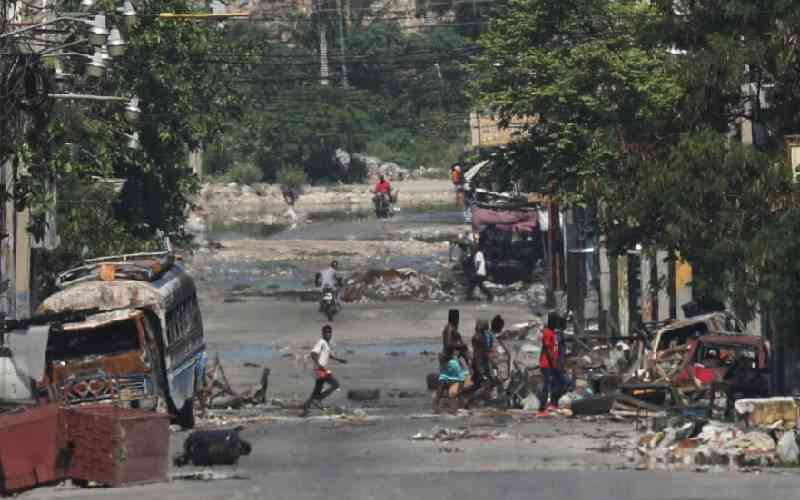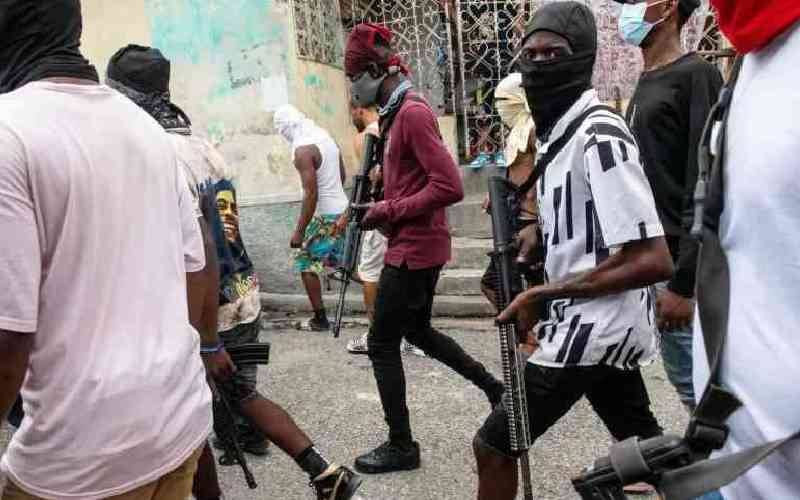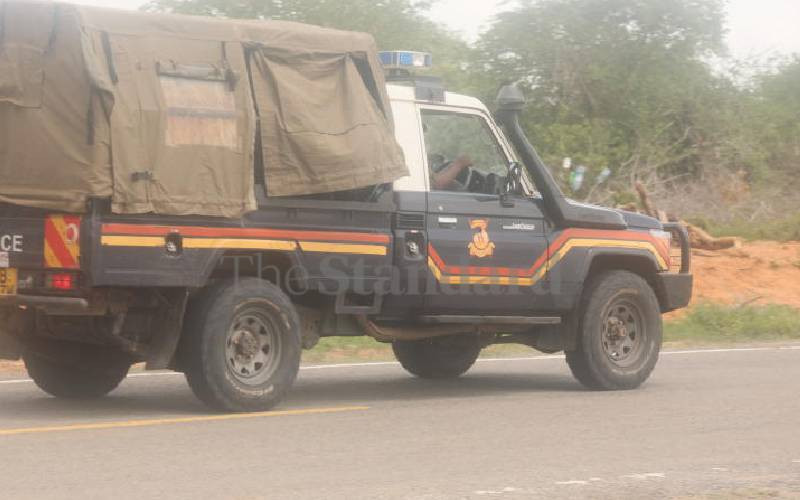 |
|
Traders in Kisumu demonstrate outside the DC’s office after two groups clashed over control of business locations in town. |
By Juma Kwayera
At a time when Kenya is fighting to restore its international image as a strategic economic investment destination, the emergence of new criminal gangs in parts of the country comes as a major setback to foreign capital inflows.
Kenyan delegations that were last week in the US and UK were forced to respond to growing fears that the country has become a playground for domestic and international criminals at a time when investments in the energy, transport and information technology sectors were showing great promise.
Therefore, revelations last week of the existence of ‘China’ and ‘US’ alias ‘American Marines’ criminal gangs in Kisumu as political militia in addition to Mungiki, Mombasa Republican Council (MRC) and Al Qaeda-linked terrorist cells in the country piled further pressure on the Government following investor concerns over security fragility as Kenyans prepare for one of the most fiercely contested elections.
As President Mwai Kibaki and Deputy Prime Minister Musalia Mudavadi attended a UN General Assembly conference in New York last week, The Standard On Sunday has reliably been informed that the two were put to task by donors over criminal gangs roaming the country.
Political instability
Consequently, some investors, especially the Diaspora community, expressed apprehension over eruption of what is believed to be politically-instigated violence in the Tana Delta, increased MRC militancy, reactivation of outlawed quasi-religious Mungiki sect, Al Shabaab retaliatory attacks in Nairobi and the emergence politically-connected criminal gangs in Kisumu.
As Kibaki and Mr Mudavadi returned to the country on Monday and Tuesday respectively, a US-based Kenyan university lecturer with interest in hydropower and telecommunication sectors told The Standard On Sunday that the Kenyan delegation was forced to respond to escalating insecurity and political instability in the face of impending International Criminal Court charges against Presidential aspirants Uhuru Kenyatta and William Ruto.
The university professor, who attended the investment forums addressed by Kibaki and Mudavadi, says there are fears the post-election violence cases may have been mishandled by The Hague and Kenya, edging the country closer on the precipice of violence.
Contacted, Mudavadi private secretary, Kibisu Kabatesi, confirmed that concerns about the emergence of new criminal gangs, revival of old ones and the possible impact of the International Criminal Court (ICC) trials were raised during meetings with investors in New York and London.
Mr Kabatesi says investors questioned the wisdom of surrendering the post-election violence cases to the ICC that is increasingly proving counter-productive to Kenya’s political stability and economic growth.
“Investors are looking for an assurance about security and political stability before committing their money to the country. Kenya is being monitored by investors, and although the international community supports the military operation in Somalia to flush out the Al Shabaab, there is also apprehension about the political direction of the country should ICC find the post-election suspects criminally liable,” explains Kabatesi. There is now an awakening to the reality that the suspects should have been tried locally, he adds.
Given Kenya’s political fragility, says Kabatesi, ICC is also coming under the microscope for failing to definitively adjudicate on eligibility of Uhuru and Ruto to run for public office before they are cleared of criminal charges.
Nominated MP George Nyamweya who was in the President’s entourage talks of investors concerns about contradictions in the State’s political and economic realm that has somewhat put investor confidence in abeyance.
Stay informed. Subscribe to our newsletter
“In one of the UN sessions we attended, Kenya was taken as a case study of a country that is able to transform itself without going to civil war. People see us more positively than we do ourselves. The irony is that, although we have managed to enact a more progressive Constitution and played a major role in stabilising South Sudan and Somalia, we still do not have faith in our institutions like the Judiciary,” says Mr Nyamweya.
Kenya a case study
The lecturer who tipped off The Standard On Sunday says questions about security came up during Kenyan delegation’s meetings in New York with the influential US-based Harvard Club, former US Ambassador to UN Development Programme Thomas Pickering, recently elected African Union Commission chairperson Nkosazana Dlamini-Zuma and Liberian President Ellen Johnson-Sirleaf among others, all expressing fears about the country’s future.
Even as Mudavadi issued a statement on Monday appealing for local trials for ICC suspects, the chair of a British overseas investment lobby, the East African Business Association, Baroness Linda Chalker raised issues with increased presence in Kenya of politically-linked criminal gangs and strained ethnic relations precipitated by the ICC.
Kabatesi says Mudavadi was forced to explain to potential investors how ICC took over the cases, which began with Parliament and the suspects initially expressing preference for The Hague process.
According to Nyamweya, the discovery of commercially viable oil in northern Kenya, besides the discovery of huge quantities of natural gas deposits near Lamu has apparently reenergised investor interest and a significant number of them are positioning themselves to plough investments in eastern Africa’s economic flagship project – the Lapsset (Lamu Port-South Sudan-Ethiopia Transport) corridor.
Fears over insecurity
The West’s appetite for an uptake of new investment opportunities in Kenya is heightened further by China, which has become a key source of economic funding.
Even as Kibaki and Mudavadi allayed fears over insecurity, Kenya’s rating internationally as an investment has been battered further following new chilling details of the presence of in Kisumu of two criminal gangs with extensive political connections.
A document in our possession, contents of which was part of a ministerial statement Internal Security Minister Katoo ole Metito read in Parliament on Thursday suggests that nearly the entire country is under the grip of criminal gangs retained by major political players in preparation of the next election violence.
The document lays out in detail the extent to which ‘China’ and ‘US Marines’ gangs are entrenched in crime in Nyanza, drawing parallels with Mungiki in Central Kenya.
The two gangs, China – registered as an economic development group – and Wash-Wash (derived from fake currency production) before mutating into US Marines are offshoots of ‘Talibans’ and ‘Baghdad’ criminal gangs – the only difference being the new groups are rooted in crimes of an economic nature or are political enforcers.
The gangs’ lifeline is carjacking, illicit drug peddling, fake currency manufacture, violent robbery and public service vehicle extortion.
The report says the existence of the gangs has discreet support of the police and accuses the security agencies of deliberately failing to crack down on the operations of the deadly gangs. The report names the leaders of the gangs that were a subject of discussion during Question Time in Parliament on Thursday.
 The Standard Group Plc is a
multi-media organization with investments in media platforms spanning newspaper
print operations, television, radio broadcasting, digital and online services. The
Standard Group is recognized as a leading multi-media house in Kenya with a key
influence in matters of national and international interest.
The Standard Group Plc is a
multi-media organization with investments in media platforms spanning newspaper
print operations, television, radio broadcasting, digital and online services. The
Standard Group is recognized as a leading multi-media house in Kenya with a key
influence in matters of national and international interest.
 The Standard Group Plc is a
multi-media organization with investments in media platforms spanning newspaper
print operations, television, radio broadcasting, digital and online services. The
Standard Group is recognized as a leading multi-media house in Kenya with a key
influence in matters of national and international interest.
The Standard Group Plc is a
multi-media organization with investments in media platforms spanning newspaper
print operations, television, radio broadcasting, digital and online services. The
Standard Group is recognized as a leading multi-media house in Kenya with a key
influence in matters of national and international interest.









